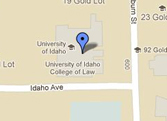College of Law
Moscow

uilaw@uidaho.edu
Administration Office: 208-885-2255
Dean’s Office: 208-885-4977
fax: 208-885-5709
Menard 101
711 S. Rayburn Drive
Mailing Address:
College of Law
University of Idaho
875 Perimeter Drive MS 2321
Moscow, ID 83844-2321
Boise
First Monday - August 6, 2007
In this issue:
- College of Law Looks to the Future, Undertakes Planning for a "Second Century"
College of Law Looks to the Future, Undertakes Planning for a “Second Century”
In conjunction with administrative leaders at the University of Idaho, and in consultation with the State Board of Education (also the UI Board of Regents), the College of Law is engaged in strategic planning on how best to fulfill the University’s statewide mission in legal education, as prescribed by the Board. The timing is right. The College, founded in 1909, will launch a “second century” of Idaho legal education in 2009.
Overview of the Planning Process. The process and the issues have been unfolding for many years. During the 1960s, when the College began to outgrow its quarters in the University’s historic Administration Building, there were voices calling for the state’s law school to be located in the state capital. The location issue was settled for a generation, however, when the “new” law school facility, the Menard Law Building, was constructed at Moscow in 1972-73.
In 1999 the University convened a panel of consultants whose report in 2000, “Strategic Directions in Legal Education for Idaho,” generated a faculty study and response entitled “Report and Recommendations of the Faculty of the University of Idaho College of Law.” The faculty report laid the foundation for establishing the College’s current Boise office, hiring a law instructor and director of external programs, and creating the semester-in-practice program. (At least one additional faculty member would have been placed in Boise, had not Idaho higher education budget cutbacks intervened in 2002-03.)
In 2003 the faculty adopted a “Statement of Strategic Direction” outlining subject areas – natural resources and environmental law, business law and entrepreneurism, and advocacy and dispute resolution, as well as international and comparative law, law and technology, and ethics and civic leadership -- deemed to be strategically important for the future. In 2005 the faculty revisited strategic issues as part of a regular, periodic accreditation self-study. In 2006 and 2007 the Association of American Law Schools and the American Bar Association reaffirmed the College’s accreditation, enabling the College to return its strategic focus to the programs necessary to meet Idaho’s statewide legal education needs.
During 2007 a law school strategic planning committee, chaired by Professor Maureen Laflin, has met regularly to define future issues, engaging the full faculty in special meetings while gathering input from the law school staff and student leaders. In April, 2007, the committee explored future issues in a two-day meeting with the Law Advisory Council, a national group of distinguished alumni and friends of the College. On July 16-18, the College and the Idaho State Bar cosponsored a “Conclave on Idaho Legal Education in the 21st Century,” held in conjunction with the Bar’s annual meeting.
The Conclave necessarily was limited in size in order to promote a thoughtful “workshop” approach to complex issues. It attracted 108 leaders of the state judiciary, legal profession, and business community, as well as the law faculty. University of Idaho president Timothy White and State Board of Education/Board of Regents member Laird Stone (UI Law ’79) also participated, along with other administrators including general counsel for the University of Idaho and counsel for Boise State University and Idaho State University. A booklet thoroughly describing the Conclave’s participants, purpose, and issues is available at a link on the College of Law website.
The Importance of Public Legal Education. As explained in the booklet and discussed in the Conclave, Idaho has a stake in both the excellence and affordability of public legal education. The excellence issue is framed by a realization that the quality of law teaching, research and service at Idaho’s public law school will determine the reputations and career opportunities available to Idaho law students. Quality also will influence the economic competitiveness of our state as well as the depth of our state’s commitment to the fair and effective administration of justice.
The affordability issue is underscored by the fact that legal education is increasingly financed by student debt; at some private schools, the debt load approaches that of a home mortgage. Student debt is a major factor determining whether students can afford to take public sector jobs or to work in private practice settings representing Idaho families and small businesses. Thus, if the growing demand for legal education in Idaho, particularly in the Treasure Valley, were supplied by a private entity, many of the students emerging with private school-level debt loads would have difficulty taking Idaho jobs.
Moreover, a public law school has a special calling to serve its state by creating leaders of the judiciary, the legal profession, and the business community; by providing scholarship in support of sound public policy and economic development; by engaging in service and outreach that enhance the performance of legal institutions; and by inculcating a culture of ethics and civic responsibility. Although all worthy law schools address these needs to some extent, the expectations for a state’s public law school are especially (and appropriately) high. They represent a valuable return on the state’s investment in higher education.
Approaches to the Future. The challenges of excellence and affordability are combined in Idaho with the need to serve a vast and diverse state. The Conclave examined location issues relating to instruction in the J.D. program as well as legal and interdisciplinary scholarship, service, and outreach. As noted during the Conclave, the College enjoys the benefits of the University’s supportive infrastructure, and interdisciplinary connections with other programs, at the Moscow location. At the same time, the Boise metropolitan area offers additional opportunities for law students and faculty in a center of population, business, and government. (Indeed, Boise is one of only five metropolitan areas in the United States without a law school within fifty miles – and the only one that is a state capital.)
Participants in the Conclave reached a broad consensus that there are no easy or simplistic answers to the challenge of fulfilling the College’s future statewide responsibilities with respect to legal education and the scholarship, service and outreach activities associated with it. There was also broad agreement also that the College must advance beyond the status quo in meeting the needs for legal education throughout the state. Changes in legal education itself – globalization, specialization, and the need for more “practice-ready” graduates – also require the College of Law to advance beyond the status quo.
The Conclave considered three broad approaches for the future:
- A “Moscow plus” approach -- expanding the College’s Juris Doctor program on the Moscow campus while retaining the “semester-in-practice” and externships in the Treasure Valley and establishing specialized research and outreach institutes in Boise.
- A “relocation” approach – moving the Juris Doctor program to Boise in addition to the specialized research and outreach institutes, while retaining administration by the University of Idaho and continuing the interdisciplinary research connections with the Moscow campus.
- A “phased dual-location” approach – maintaining the Moscow location while expanding the “semester in practice” to a full third year, establishing the specialized research and outreach institutes, and then broadening the J.D. instruction in Boise to a full three-year branch program (possibly including a part-time course of study).
Each of these approaches would increase the College’s presence in Boise, albeit in varying degrees and in differing time frames. Each could provide a unique opportunity for collaboration with the Idaho Supreme Court, which recently has developed a proposal to move the Idaho State Law Library (now contained within the Supreme Court) to a new, adjacent building that could also serve as an “Idaho Law Learning Center.”
Next Steps in the Strategic Planning Process. No decision has been made regarding these approaches. Indeed, the Conclave did not “vote” on the approaches; rather, working groups within the Conclave explored the strengths and weaknesses of all of the approaches and variations of them. There was a consensus, however, that expansion of the College’s presence in Boise is necessary, and that all of the approaches will require substantial new resources. These resources might come from a combination of legislative appropriation support, student tuition and fees, and private giving.
Any major future initiative must be developed in close collaboration with, and will be subject to approval by, the State Board of Education/Board of Regents. President Timothy White noted during the Conclave that the “paramount consideration is what is best for our students – in terms of depth and breadth of the curriculum and preparation for practice, along with cost and access considerations - and best for the citizens of Idaho in terms of the number, quality and skills of graduates from our program.” State Board and Regent member Laird Stone told the Conclave that the Board is very interested in the quality and accessibility of legal education in Idaho, and will give strong consideration to the well-informed, thoughtful judgments of legal educators, senior University administrators, and the Idaho bench and bar.
During the remainder of this summer and fall, the faculty and administration of the College of Law will work with consultants, with senior University leadership, and with the State Board to develop a strategic plan that fulfills the College’s statewide mission and embodies the insights developed during the Conclave. Updates on the plan will be presented in “First Monday” and during the Idaho State Bar “road show” meetings with the district bar associations. Questions concerning the College’s strategic planning process may be addressed to Don Burnett, Dean of the College of Law, dburnett@uidaho.edu.


